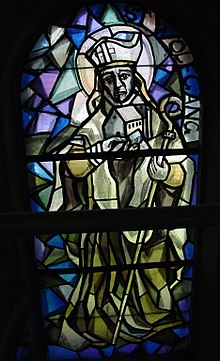Wolfgang, Bishop of Regensburg
| Saint Wolfgang | |
|---|---|

Saint Wolfgang, stained glass, Parish Church in Leising
|
|
| The Almoner | |
| Born | c. 934 |
| Died | October 31, 994 |
| Venerated in |
Roman Catholic Church Eastern Orthodox Church |
| Canonized | October 8, 1051 by Pope Leo IX |
| Feast | October 31 |
| Attributes | forcing the devil to help him to build a church; episcopal dress; depicted with an axe in the right hand and the crozier in the left; or as a hermit in the wilderness being discovered by a hunter. |
| Patronage | apoplexy; carpenters and wood carvers; paralysis; Regensburg, Germany; stomach diseases; strokes |
Saint Wolfgang of Regensburg (Latin: Wolfgangus; c. 934 – October 31, 994 AD) was bishop of Regensburg in Bavaria from Christmas 972 until his death. He is a saint of the Roman Catholic (canonized in 1052) and Eastern Orthodox churches. He is regarded as one of the three great German saints of the 10th century, the other two being Saint Ulrich and Saint Conrad of Constance.
Wolfgang was descended from the family of the Swabian Counts of Pfullingen (Mon. Germ. His.: Script., X, 53). When seven years old, he had an ecclesiastic as tutor at home; later he attended the celebrated monastic school at Reichenau Abbey. Here he formed a strong friendship with Henry of Babenberg, brother of Bishop Poppo of Würzburg, whom he followed to Würzburg in order to attend the lectures of the noted Italian grammarian, Stephen of Novara, at the cathedral school.
After Henry was made Archbishop of Trier in 956, he summoned Wolfgang, who became a teacher in the cathedral school of Trier, and also laboured for the reform of the archdiocese, despite the hostility with which his efforts were met. Wolfgang's residence at Trier greatly influenced his monastic and ascetic tendencies, as here he came into contact with the great reform monastery of the 10th century, St. Maximin's Abbey, Trier, where he made the acquaintance of Saint Romuald, the teacher of Saint Adalbert of Prague.
...
Wikipedia
